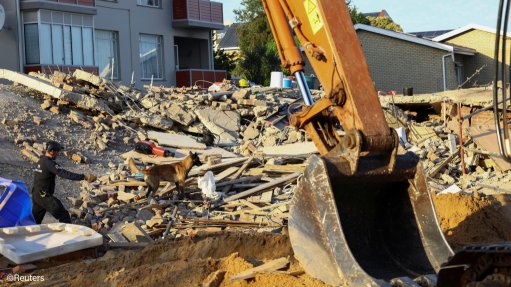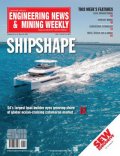The Number of Fatal Truck Crashes on South Africa's Major Roads is Unacceptable
This article has been supplied as a media statement and is not written by Creamer Media. It may be available only for a limited time on this website.
By Dumisani Nkabinde
Trucks, and the freight they carry, have an integral role to play in South Africa's transport infrastructure and our country’s economy. However, a significant increase in road freight transport on South Africa’s national roads over the last decade has also led to a rising number of fatal crashes involving trucks. A tragic reminder of this was the multi-vehicle pile-up which occurred on Easter Monday involving over 40 trucks, taxis and light motor vehicles on the N3 between Hilton and Cedara.
The accident claimed the lives of a total of six people and left nearly 80 injured. This is unacceptable.
In 2022, 77% of all light motor vehicle crashes on the N3 and 85% of all truck crashes on the N3 were attributed to human error. Trucks were involved in 57.3% of all crashes on the N3 toll route. Furthermore, a study by the Road Traffic Management Corporation (RTMC) showed that heavy load vehicles with a gross vehicle mass above 3,500 kilograms account for 9.4% of all fatal crashes on South African roads, while they make up just 3.3% of the vehicles recorded on our roads.
It is impossible to lay the blame for all truck and freight-related accidents at a single door. However, of all road accidents, truck accidents tend to result in the most fatalities and serious injuries, multiple vehicles and the greatest damage to property. What is clear is that the rising number of truck-related accidents on our major roads is unacceptable and the need for action is beyond urgent. Reducing the number of fatal truck accidents on South Africa's roads requires that all industry stakeholders work together towards this common goal. SANRAL is committed to playing its part and calls on all role-players to heed the call to do the same.
Freight transport growth
Over the last decade, South Africa has seen enormous growth in road freight transport as people and commercial cargo trucks have migrated from rail transport to roads. Transnet Freight Rail volumes handled have reduced by as much as 80% since 2010 and, in 2022 alone, rail freight declined by 22.4%, as a consequence of factors such as vandalism, flood damage, safety and maintenance issues.
The beneficiary of this reality was road freight, which on average now accounts for approximately 84% of total freight transportation in South Africa. If you consider that the reduction in rail freight has caused a loss of approximately 2% to South Africa’s annual GDP (amounting to approximately R92bn), the economic impact becomes clear – and it is easy to understand why freight transport companies have made the switch to roads in order to ensure the safe and timely arrival of their goods.
Passenger rail volumes are also estimated to be more than 80% lower than they were in the late 2000s, and while the Passenger Rail Agency of South Africa (Prasa) is working to rebuild South Africa’s commuter rail system and Cabinet approved a white paper on the National Rail Policy in March this year, it will take time before rail operations are sufficiently restored for a meaningful switch back to rail.
Why accident rates are so high
Increased congestion alone cannot be blamed for the high number of truck-related accidents on our roads. Other reasons include overloading, driver fatigue and lack of compliance with road laws, vehicles that are not roadworthy or well maintained, stretched law enforcement capabilities, deterioration in road surfaces and insufficient road maintenance, and pedestrian safety and awareness.
Road maintenance not the only factor
SANRAL’s mandate is to manage and maintain the national road network and the Agency is extremely conscious of the need to keep the road network in good condition. Roads that are poorly maintained negatively impact road users and our economy.
Road surfaces are impacted by weather and high volumes of traffic, especially heavy (and often overloaded) vehicles - all of which contribute to the creation of potholes, cracks and other structural problems. Roads which were never built for the added workload that is now imposed on them are therefore degrading faster, requiring significant efforts to fund pothole repairs and other surface maintenance on the major roads.
The impact of overloading
Research has shown that even a small amount of overloading has a major influence on the quality of roads, causing premature road deterioration, which escalates over time. Damage to the road by axle loads exceeding the legal limit increases out of all proportion to the excess loads.
For example, an axle carrying double the legal load may cause from 4 to 60 times as much damage as one legal axle load, depending on the condition of the structure and type of road. In fact, it has been estimated that as much as 60% of the damage to the road network in South Africa is caused by illegally overloaded heavy vehicles.
In addition to the road damage they cause, overloaded vehicles become a traffic hazard, requiring better driver handling and additional braking distances. Injuries and destruction caused by truck crashes are often severe because of their size and weight – and overloading only worsens matters.
It is important that the Road Freight Association and other stakeholders in the trucking industry encourage compliance with all road regulations. Similarly, levels of enforcement need to be improved to keep pace with the growth in truck numbers on our roads. This includes enforcement of speeding, as well as the need for more weighbridge inspections.
The human element
High demand for road freight, added to a shortage of Code 14 truck drivers in the country means that truck drivers are under pressure to be behind the wheel. A survey conducted by the University of the Witwatersrand showed that as many as half of all long-haul truck drivers in South Africa get less than 5 hours of sleep a day and that they work an average of 93 hours a week - well over the maximum 71 hours per week mandated by the South African Labour Relations Act.
It is not surprising then that, according to Arrive Alive, 39% of the main problems experienced by truck drivers are fatigue related, while 41% of road accidents are fatigue related. Suffice to say that driver fatigue impairs driving skills, making drivers less alert and impacts co-ordination. Self-regulation of rest periods, better communication between fleets and sufficient safe, clean rest stops where drivers can park at night are all important aspects to limiting driver fatigue.
Fatigue isn’t the only human element at play. According to the Road Traffic Management Corporation (N3TC’s) crash data for the first 10 months of 2022, 79% of all light motor vehicle crashes and 85% of all truck crashes were due to driver ineptitude and negligence. Additional driver training is therefore required to upskill drivers and encourage compliance, particularly bearing in mind that when a truck is overloaded the problems are compounded.
The Safe System approach
We know that road user behaviour contributes significantly to South Africa’s road safety crisis and SANRAL believes the mission for safer roads is a shared one that requires collaboration across all sectors of society.
SANRAL supports the Safe Systems approach to road safety, which involves the design, construction and maintenance of a road traffic system that aims to reduce human error, minimise crashes and reduce the risk of serious injury or death when a crash does occur. It also includes the implementation of road safety educational and awareness programmes aimed at changing attitudes and behaviour among all road users.
Working together for a safer future on our roads
If there is one thing that all stakeholders in road safety can agree on, it is that too many South Africans are being killed and seriously injured on our roads. Taking a holistic view of the road transport system and placing emphasis on our shared responsibility for road safety, everyone – from road users and policymakers to transport planners, fleet owners, truck drivers, enforcement agencies, infrastructure designers and roads agencies like SANRAL – must play a part.
All stakeholders must come together to make our roads safer, and we must all take responsibility for the areas under our control. It is only if we approach this scourge jointly and with the urgency required that the actions we take will make a difference to the unacceptable number of lives tragically lost on our roads.
Comments
Press Office
Announcements
What's On
Subscribe to improve your user experience...
Option 1 (equivalent of R125 a month):
Receive a weekly copy of Creamer Media's Engineering News & Mining Weekly magazine
(print copy for those in South Africa and e-magazine for those outside of South Africa)
Receive daily email newsletters
Access to full search results
Access archive of magazine back copies
Access to Projects in Progress
Access to ONE Research Report of your choice in PDF format
Option 2 (equivalent of R375 a month):
All benefits from Option 1
PLUS
Access to Creamer Media's Research Channel Africa for ALL Research Reports, in PDF format, on various industrial and mining sectors
including Electricity; Water; Energy Transition; Hydrogen; Roads, Rail and Ports; Coal; Gold; Platinum; Battery Metals; etc.
Already a subscriber?
Forgotten your password?
Receive weekly copy of Creamer Media's Engineering News & Mining Weekly magazine (print copy for those in South Africa and e-magazine for those outside of South Africa)
➕
Recieve daily email newsletters
➕
Access to full search results
➕
Access archive of magazine back copies
➕
Access to Projects in Progress
➕
Access to ONE Research Report of your choice in PDF format
RESEARCH CHANNEL AFRICA
R4500 (equivalent of R375 a month)
SUBSCRIBEAll benefits from Option 1
➕
Access to Creamer Media's Research Channel Africa for ALL Research Reports on various industrial and mining sectors, in PDF format, including on:
Electricity
➕
Water
➕
Energy Transition
➕
Hydrogen
➕
Roads, Rail and Ports
➕
Coal
➕
Gold
➕
Platinum
➕
Battery Metals
➕
etc.
Receive all benefits from Option 1 or Option 2 delivered to numerous people at your company
➕
Multiple User names and Passwords for simultaneous log-ins
➕
Intranet integration access to all in your organisation


















